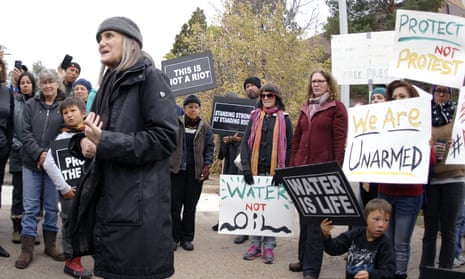For far too long, the world had been ignoring the North Dakota anti-pipelines protests. Then the Democracy Now! host Amy Goodman captured private security forces (employed by a fossil fuel company) sicking dogs on Native Americans during a peaceful demonstration against the Dakota Access Pipeline, which encroaches on their sacred lands and waters. For that, she nearly went to jail.
The video made Goodman a target of North Dakota authorities, who brought charges of trespassing and rioting against her and the native leaders on the ground during the dog attack. Yes, a journalist was threatened with punishment for reporting on the horrific attack on indigenous people.
Authorities said Goodman didn’t deserve press protections because her opinions made her an “activist” instead of a journalist. Are we to punish every journalist who calls out state violence as he or she sees it? How could you not have an opinion in the face of such brutality? Should Walter Cronkite have gone to prison for his words about Vietnam?
Clearly not. Organizations defending freedom of the press decried the charges against Goodman. Activists like ourselves rallied behind her cause online because we understand the importance of a free press to social change. And on Monday, a North Dakota judge dropped the charges due to lack of probable cause.
It’s a win for freedom of the press, but intimidation by the fossil fuel industry and its government allies is far from over. Native leaders at the Standing Rock camps know this all too well, as they continue to face arrests by North Dakota police and pressure by Energy Transfer Partners, the company behind the pipeline.
There’s no question that Goodman’s fearless reporting helped make this act of brutality a turning point in the fight to stop the Dakota Access Pipeline. Soon after her broadcast, the Obama administration stepped in and paused the project until there could be “further consultation” of indigenous peoples. Suddenly, TV news and the mainstream media took up the story in a serious way for the first time. Thousands of more people headed out to the camp.
The trampling of our rights as activists, or as journalists, isn’t just a problem in North Dakota. It’s also a fight that’s playing out around the world wherever communities stand up to the fossil fuel industry and other corporate interests destroying our communities and climate.
We see it in the murder of activists like Berta Cáceres in Honduras. We see it in the Philippines, where anti-mining activists are being murdered by paramilitary groups. According to a report by Global Witness, 185 environmental activists in 16 countries were killed last year and the number is just going up.
Despite this violence, the movement to challenge the fossil fuel industry has continued to grow more powerful, and we’re not backing down. As the work to stop the Dakota Access Pipeline continues, I’m honored to stand in solidarity with the incredible Native American leaders at Standing Rock who are putting their bodies on the line to shut this destructive project down. The photos and videos of their brave actions have become lightning rods, channeling tremendous new energy into this movement. This is a historic fight unfolding in real time.
The images of resistance at Standing Rock are a call to action. We cannot let the rights of indigenous peoples be sidelined by the fossil fuel industry, and we can’t afford another pipeline if we want to maintain a livable planet.
We also must fiercely defend the rights of activists and journalists alike to tell stories like these, stories that often unfold in sacrifice zones far from the “halls of power”, and to tell them fairly and honestly. This won’t be the last fight against a pipeline and Amy Goodman won’t be the last journalist brought to court for reporting about the fossil fuel industry. The struggle continues, together.
